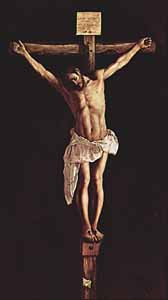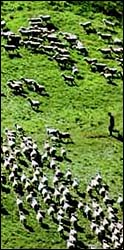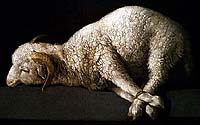If you were to ask each man and woman who joined in the death watch that “Good” Friday, each could tell you of some personal connection to Jesus. There’s John the beloved disciple, with Mary, Jesus’ mother. Here are Lazarus and Mary and Martha, Jesus’ friends from Bethany. The woman taken in adultery is here, too, in shock, and dozens of others. Each has a connection to the man crucified on the center cross. Some remember a healing, others his life-giving words by the shore of Galilee. Others recall a second chance the Master extended to them. Each has a connection.
They stand in clumps, here and there on that stark hill, drawn together by the sheer terror of what is happening. Two words describe what they feel: appalled and shattered.
But off by himself, as close as he could get to the base of the cross, is a tall, gangly sixteen-year-old with thick black hair and an angular jaw that makes him appear decisive, though at heart he is a dreamer and thinker.
But now his eyes are hard and narrow, staring at the blood that is dripping from the rough-hewn crossbar above. It has made a glistening pool in the rocky surface below, and each time another drop falls and breaks the surface of the puddle, Jonathan winces.
Jericho
Jonathan’s connection to Jesus goes back a full three years to Jericho and the Jordan when he was thirteen. Jonathan was a shepherd who had grown up out-of-doors, familiar with each hill and vale on the Jericho plain, for he had grazed his father’s sheep there since he had been a lad. Of all the shepherd boys, Jonathan had always been curious about God. He was always pestering the town rabbi with questions.
That same hunger to learn explained Jonathan’s presence one sultry day when John the Baptist had been preaching and baptizing at the nearby River Jordan. Whenever he could slip away and leave the sheep with his brothers, Jonathan would run down to the Jordan in long, loping strides, until he reached the crowds at the riverside.
John the Baptist
With a voice that seemed to carry for miles, the Prophet was saying, “You blind and thoughtless people! You live as if there is no tomorrow. Don’t you know that the axe is already at the root of the trees? Don’t you know that every tree that does not bear good fruit will be cut down and thrown into the fire? Don’t you know?”
The Prophet had a kind of desperateness about him as he would call out to the multitudes that stood hushed along the banks. “Don’t you know that the Kingdom of God is at hand, that Messiah is nearly come? Don’t live in your sins any longer! Cleanse your hearts and your ways, and be baptized! Wash away your sins and receive forgiveness from your God!”
Jonathan had been one of those who had waded into the water in response to the Prophet’s call. “Yes, Lord, cleanse my heart,” he had prayed. “Make me ready for your Kingdom.” And as Jonathan came up out of the water he had felt God’s forgiveness and newness. At thirteen he had become a son of the Law. Now he was a son of the Kingdom, too.
Behold, the Lamb of God
As he had stood, water dripping from his long hair, something strange and wonderful had occurred. Suddenly the Prophet was silent, and just stood staring. Staring at something on the riverbank. As the Prophet continued to stare, soon every eye of every person followed his gaze. John the Baptist was looking at a man walking at the river’s edge.
“Behold!” John the Baptist had said in awe. “Behold! The Lamb of God, who takes away the sin of the world.” And at that, the Prophet bowed his head slightly out of reverence, and as he did, so did the rest of the people.
The man had nodded almost imperceptibly to the Prophet in response, and then continued to walk along the bank. The crowds parted as he came to them and they let him through. Then he had passed on, out of sight, and it was over.
Soon the crowd was all a-buzz. “Who was that?” they asked one another.
“Jesus, the carpenter from Nazareth,” said one who knew him, and soon the word spread throughout the crowd. “It is Jesus. Jesus, the carpenter from Nazareth.”
The next day it was the same. Preaching, baptizing for hours throughout the morning and then the Prophet stopped again, and again his gaze fell upon the man.
“Lamb of God,” Jonathan could hear the Prophet say with hushed reverence. “Behold, the Lamb of God who takes away the sin of the world.”
Why a Lamb?
That’s it? That is Jonathan’s connection to this man on the cross? Didn’t he even hear Jesus teach or see him perform a miracle?
Actually, no. When Jesus came to Jericho a year or two later and converted that notorious tax collector Zacchaeus, Jonathan had been away in search of ungrazed fields for his flock.
So what kind of tenuous connection is this?
Not tenuous at all. Persistent, obsessive, perhaps — anything but tenuous — because the vivid image of Jesus’ face and those very strange words, “Lamb of God,” had burned indelibly into Jonathan’s heart.
What does “Lamb of God” mean? he wondered. Next chance he got, he asked the rabbi.
“What is the Lamb of God, Rabbi?”
The old man gestured for him to sit down in the shade outside the Jericho synagogue that hot afternoon. Then the old rabbi eased his tired body onto a stool next to the doorway.
The Passover Lamb
|
|
“You know, Jonathan,” the white-bearded rabbi began, “that lambs are regularly sacrificed for the sins of the people.
“Then, too, your father takes his best lambs up to Jerusalem every spring for Passover. Centuries ago, boy,” he said, “when God brought us out of the land of Egypt, Pharaoh didn’t want to let our people go. You remember the ten plagues God brought on the Egyptians under Moses? The final plague was to be the death of the firstborn.
“So that first Passover which took place the night before the Great Exodus, a lamb was sacrificed for each family. Each father dipped a branch of hyssop into the blood of his family’s sacrifice, and daubed it on the doorpost and lintel of his house.”
As the rabbi continued to speak, Jonathan’s mind could visualize the slaughtered lamb. And he could see the fresh blood of the lamb that had been painted onto the doorpost. He could see it drip down the post and dribble onto the ground.
“And at evening on that Day,” the rabbi continued, “each father made very sure that each child — each son, each daughter — had been brought inside the house and accounted for. Because outside that night, the Lord struck the land of Egypt, slaying the firstborn son of every family in the entire kingdom. Every firstborn died, except for those sons of Israel whose fathers had sacrificed a lamb and painted its blood on their doorposts as a mark of faith.
” ‘When I see the blood,’ God had promised, ‘I will pass over you.’ And He did pass over us,” the rabbi concluded. “Not one firstborn Israelite met death that night when death was all around us. And by morning all Israel walked free, journeying out of the land of bondage into a new day of liberty.”
So the “Lamb of God” is a Passover lamb, thought Jonathan, as he thanked the rabbi and returned to his father’s flocks. A Passover lamb.
Lambs for the Temple
Jonathan’s father had a contract to deliver eight dozen Passover lambs to the Temple in Jerusalem a few days before Passover. Jonathan, now sixteen, and his older brother Benjamin were given the responsibility of bringing these 96 lambs to Jerusalem.
As Jonathan’s flock climbed the Jericho Road up to Jerusalem, he pondered these sheep and their wonderful and awful role in redemption. Two weeks from now, each would have been slaughtered, and its blood poured out. Had this been ancient Egypt, each lamb would have been sacrificed for a family so that the Lord might pass over them — the lamb’s life given in exchange for the lives of the family.
Jonathan looked at the white, woolly backs of these yearling lambs as they bobbed up and down on the road to Jerusalem. What a burden for an innocent sheep, to die for a family. His father’s lambs would suffice for ninety-six families, but what about the rest? Jonathan’s dark eyes were fixed on the road ahead, but his mind was a thousand miles away. Only ninety-six families. Surely there are enough lambs for the others.
Jerusalem
But there was no time for the lazy musings of the upward path now. They had reached the summit of the hill, and beyond them was the glorious panorama of the Holy City, the gold of the Temple gleaming in the noonday sun. What a thrill!
Now down to the Kidron brook that runs along the east side of the Temple. Then the flock struggled up the steep grade to the Sheep Gate where they were inspected by a priest. And as each was found to be without blemish, each was certified as an approved sacrifice. And each of those unblemished sheep would bring Jonathan’s father a handsome price.
For the next few days Jonathan and his brother guarded the certified yearling lambs until the day of Passover. Then their task would be over and they would return to Jericho.
 Francisco de Zurbar�n (1598-1664), “The Crucifixion” (1627), oil on canvas, 290 x 168 cm, Art Institute Museum, Chicago.Larger image. |
Jesus, too, was in Jerusalem, Jonathan had heard. Jonathan hoped to get to see him before going home. But the sheep kept him busy and soon his few days in the Holy City were nearly over.
Then in rapid succession, Jonathan heard bits of the shocking news that flashed throughout the city. Jesus had been arrested! Now he was being tried. Now condemned to death. How could this be? How could it?
Jonathan’s duties were over now and he was free to roam the pilgrim-packed city. But there was little joy in the city this year. Tension, yes, and hatred. There was fear and anger, too, as the Romans carried out their grizzly task of crucifying the popular hero Jesus.
At the Cross
Many others had heard the news by now, and Jonathan joined the crowd that surged along the road that led to the killing ground outside the city to see if it were really true. There Jonathan finally saw him on the center cross, dying. Jesus! He looked like Jonathan remembered him, yet drained, crushed, as it were, by the weight of the world. A crown of thorns had been pressed into his scalp, and his hands and feet had been spiked to the huge cross that stood naked against the foreboding darkness.
Jonathan pushed closer. Part of him wanted to run and hide. But part of him had to see, had to see for himself. Jonathan edged his way through the press of mourners until he came to the perimeter set up by the soldiers.
Jonathan stood transfixed, tears running down his cheeks. And then he heard Jesus declare in a weak voice, yet clearly, “Father, forgive them, for they know not what they do.”
“What are they doing?” Jonathan wanted to shout. “What are they doing to this holy and righteous man?”
Jonathan’s eyes followed another droplet of blood as it lingered for a moment on the wooden crossbeam, and then fell onto the rocks below the cross.
Perhaps of all the onlookers that day, Jonathan alone remembered and began to understand.
“Behold,” Jonathan said out loud, but quietly so that no one could hear unless listening intently. “Behold,” said Jonathan, weeping silently, now dropping to his knees.
Source joyful heart




